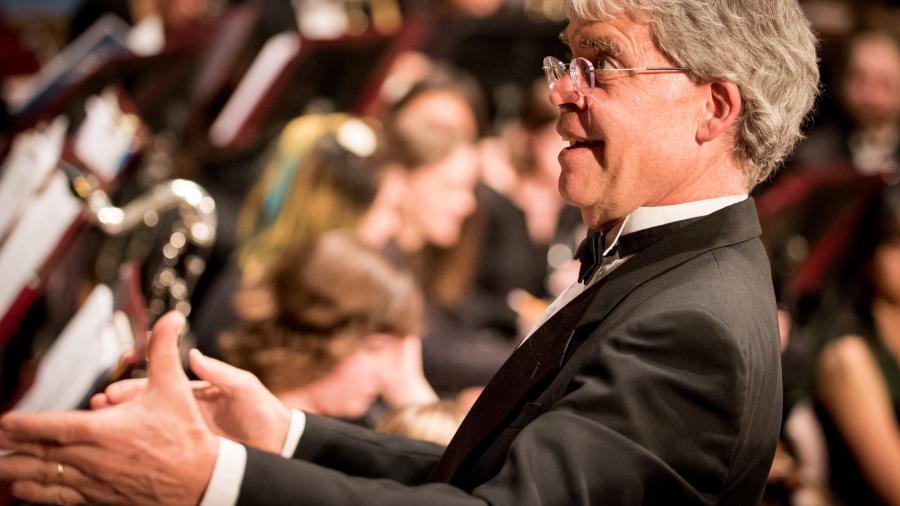Westmont Magazine Retiring Choral Leader Will Keep on Singing

In many ways, Grey Brothers’ life reflects the breadth of a LIBERAL ARTS education, encompassing many different fields, exploring interests and discovering hidden talents. The longtime music professor, who retires this spring after teaching at Westmont for nearly 30 years, graduated from UC Davis with a degree in renewable natural resources and an interest in solar energy design. He worked in construction, with ceramic tile, on a farm and even drove a tour bus in Alaska.
But as he pursued a wide range of occupations during his mid- 20s, his interest in music continued to grow. Born and raised in Fillmore in Ventura County, Brothers had grown up performing folk music by ear, playing the mandolin, guitar and fiddle and singing in choirs. “I decided to get more into music and started studying part time to learn how to read notes,” he says. “My life before music primed me to see students as whole, multifaceted people,” he says. “I tell students a little bit of my story because I want them to know that if they’re interested in pursuing music they don’t have to have played piano since they were five. I’m an example to students who might feel they love music but think that they’re not good enough.”
When Brothers began teaching at Westmont in 1993, a year after he earned his Master of Arts in musicology from UC Santa Barbara, the music department needed someone to perform multiple duties along with teaching the study of music.
“Westmont was an ideal fit for me because I could be a practitioner, a performer, a singer and a conductor, although my degree is not in performance,” says Brothers, who earned a doctorate in musicology from UCSB in 2001 while teaching at Westmont. “At a larger research institution, I likely wouldn’t have had the opportunity to do so many different things — and they all influence each other.”
Grey has led or co-led Westmont in Mexico and Europe Semester and directed first-year choral groups, the Choral Union, and the Westmont Chamber Singers. “Westmont has seen my performance as part of my professional development here,” he says. “At a research institution, it would have been solely based on what I published. Nobody would have cared if I sang or conducted. And Westmont has been consistent with the LIBERAL ARTS valuing the whole person.”
Now the department, having grown significantly over that time, seeks to hire someone specifically in the field of musicology who is publishing research. “Through my advocacy of the academic field, the college now sees it as a real value — that music has a history that should be taught well,” he says.
Along with opening Westmont gatherings by singing a hymn, Brothers will also be remembered for the World Music Survey Class he created and taught. “It’s also outside my discipline, but it has enriched my own professional development.”
Alumnus Chet Stussy ’20, who enrolled in the doctoral musicology program at UCSB, says his own musicological interests were fostered by Brothers. “His sincerity and wit proved to be a veritable source of inspiration and enthusiasm as we journeyed through the gamut of Western music history,” Stussy says.
Matthew Roy ’07, who earned a doctorate in music from UCSB and is an adjunct professor at Westmont, says Brothers was a role model and inspiration. “One of the things I value most about Grey is his genuinely human approach to teaching and music- making,” Roy says. “Whether creating beauty through vocal arts or digging through the strata of music's history, he has never resorted to academic posturing, but rather draws students into the processes of learning through humility, curiosity, excellence and an impeccably dry humor.”
Ryan Ebright ’03, who earned a doctorate at University of North Carolina at Chapel Hill and serves as assistant professor of musicology at Bowling Green State University, says in his four years at Westmont, Brothers served as both a professional and personal role model. “His inspiring blend of musicianship, teaching and scholarship was something I now strive to emulate in my own career as a musicologist,” Ebright says. “Even more important to me, though, was seeing the daily living out of his Christian faith through these activities.”
Brothers’ wife, Carrie, is a physician assistant working in Humboldt County, where they hope to retire on a farm. The two spent a year from 2020 to 2021 working in an underserved population in Sierra Madre of Northern Mexico, visiting villages in a four-wheel drive vehicle they’d equipped to be a mobile medical clinic. While there, Grey set out to record and preserve Christian devotional music by the indigenous Tarahumara. (See “A Ministry of Medicine and Music in Mexico” in the fall 2020 Westmont magazine.)
His interest in Mexican music dates back to his doctoral studies at UC Santa Barbara, where he performed with a music group that presented choral music composed in colonial Mexico. His dissertation, “The Polyphonic Passion in 17th Century Mexico,” fueled his desire to see the manuscript Mexican choir books in person at the Mexico City Metropolitan Cathedral archives in 1997. Over the years, he has returned to spend several weeks researching in the archives. He has even traveled to the 290-year- old Oaxaca Cathedral.
He edited ancient pieces of music that hadn’t seen the light of day since the 17th century and performed them with the Westmont Chamber Singers and with the choir at Trinity Episcopal Church, where he served as minister of choral and congregational music for 33 years.
“My worlds came together as a professional church musician and a researcher,” he says. “It became our standard practice during Holy Week to sing the music of the Passion from composers, who for centuries set the Gospel stories of Jesus’ arrest, trial and crucifixion to music. A central part of the sacred music of Spanish Catholicism was to compose new musical settings of these texts, which happens to be the focus of my research.”

